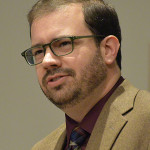 One of the encouraging responses I have witnessed in the wake of the mass shooting at the gay nightclub Pulse in Orlando is the admission of guilt on behalf of some churches and religious leaders, recognizing that the perpetuation of our theological messages about LGBTQ people over the years has been death-dealing. Many have seen anew the connection between anti-LGBTQ theological narratives and the perpetuation of violence against LGBTQ people in society. Others now recognize that even our silent complicity in this spiritual violence has a high cost.
One of the encouraging responses I have witnessed in the wake of the mass shooting at the gay nightclub Pulse in Orlando is the admission of guilt on behalf of some churches and religious leaders, recognizing that the perpetuation of our theological messages about LGBTQ people over the years has been death-dealing. Many have seen anew the connection between anti-LGBTQ theological narratives and the perpetuation of violence against LGBTQ people in society. Others now recognize that even our silent complicity in this spiritual violence has a high cost.
I have written elsewhere about how anti-LGBTQ violence is fueled by theological narratives. In sum, for generations, the denigration of LGBTQ people has appealed for validation to the most powerful language and symbols available to humanity, setting messages of scorn within an ultimate context by conscripting sacred text and even the mind of God in the justification of oppressive activity. The theological maligning of LGBTQ lives makes it easy to know who it is theologically appropriate to hate, whose bodies are fitting targets for violence, and whose souls even God couldn’t care less about.
For LGBTQ people, the mechanisms of oppression have nearly always been waged first against our souls. But it never ends there. This spiritual violence has led to innumerable suicides, hate crime violence beyond what we know through the collected statistics, and the marginalization of LGBTQ people in the very institutions they should feel most at home: their families, their churches, and their communities.
Feeling remorseful for this history of theological violence against LGBTQ souls isn’t enough to cultivate spiritual and physical wellbeing for new generations of LGBTQ teens, or to make our churches more welcoming spaces for the fullness of LGBTQ lives, or to heal the deep wounds of our religious institutions wrought by severing parts of our collective body asunder through spiritual violence. Rooting our response in the gospel, our call is not simply to feel guilt over past harm or even to ameliorate of future harm, but to heal the wounded and bind up the broken and to become repairers of the breach we have created. In the case of battles waged against the souls of queer folk, our reparations for wrongdoing must address the ways we’ve spiritually and theologically structured our lives and institutions to marginalize, silence, and spiritually harm LGBTQ people for generations and to repair the damage wrought by this violence.
These spiritual reparations might look something like:
- Supporting initiatives to help homeless LGBTQ youth in your city in response to the ways theological narratives about LGBTQ people have wreaked havoc on families that reject their queer children based on these narratives’ implicit and explicit messages. (I have written elsewhere how you might get started on this work.)
- Supporting initiatives to address LGBTQ suicide in response to the ways theological narratives about LGBTQ people have wreaked havoc upon the psyches and souls of LGBTQ people, at times making life seem unlivable. (Here’s a place to start.)
- Funding scholarships for LGBTQ seminarians within your denomination or at a local seminary, helping a new generation of LGBTQ people to follow their sense of call to enter ministerial training after being barred from following this call for generations.
- Actively seeking out qualified LGBTQ candidates for your congregation’s ministerial positions. If your church considers itself a “Welcoming & Affirming” congregation but the general consensus is that you wouldn’t hire an LGBTQ minister, you still have work to do to become truly “welcoming” of LGBTQ people into the full life of the church and “affirming” of the goodness and wholeness of LGBTQ lives.
- Regularly studying theological literature written by LGBTQ theologians. Not just books that argue for LGBTQ inclusivity, but theological texts that take the embodiment of sexuality and gender identity seriously in their analysis. If you don’t know any, you could start with James Alison or Patrick Cheng or Pamela Lightsey or Elizabeth Stuart.
- Inviting LGBTQ preachers into the pulpit at least a few times a year if you don’t regularly have queer folks filling that roll in your congregation. The visibility of LGBTQ religious leadership is important in resisting the power of deeply ingrained anti-LGBTQ religious narratives – especially for the LGBTQ young people in your church.
- Straight and cisgender clergy cultivating relational space with queer clergy in your city or denomination in which queer clergy have the opportunity to speak to their experience in a space of openness and receptivity.
- Your church being the first to respond vocally and prophetically in public spaces to the attempt to pass laws that harm LGBTQ people in your community and building coalitions to eradicate those laws that already do, and risking something of your own institutional life to do so. (Use this site, select a state or an issue, and assess the legal climate in your state.)
- Standing up to sibling congregations and denominational bodies that perpetuate anti-LGBTQ theological messages, holding them accountable for the soul violence they are doing to LGBTQ people.
Churches owe LGBTQ people a spiritual debt for the decades upon decades of violence against our souls. It’s time to start paying up.
